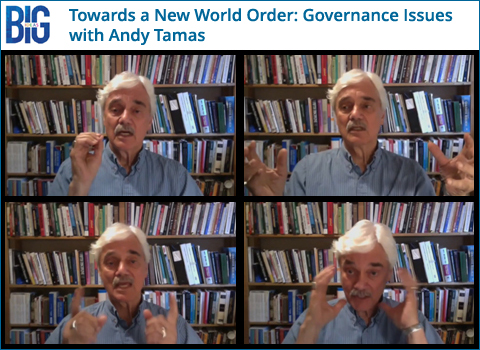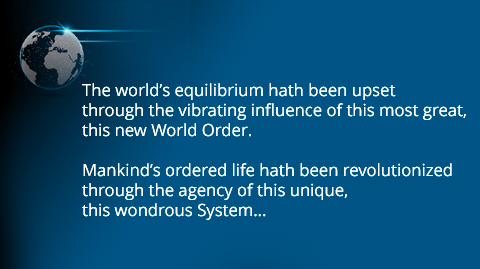 |
 |
|
September 8, 2020 PUTTING OUR HOUSE IN ORDER Since January 2020, wonderfully large ideas have been the topics of conversation among the Bahá’ís of Ottawa and like-minded friends. The climate crisis, human rights, decolonization, and the place of agriculture amidst industrialization are among the concepts explored, via the Bahá’í teachings, in the Big Ideas series On 21 August, Andy Tamas offered a Zoom presentation titled “Towards a New World Order: Governance Issues”.  A longtime consultant in organizational development, Tamas attained a mid-career Ph.D. studying governance in failed states – engaging with national and supra-national organizations on what works in those contexts. “The Bahá’í revelation,” he began, “has many powerful implications for world governance.” Its author, Bahá’u’lláh, insisted on two vital concepts: the essential oneness of humanity, and a new system of world order as a reflection of this oneness. He wrote, over 140 years ago:
The world’s equilibrium hath been upset
through the
vibrating influence of this most great, this new World Order. Mankind’s
ordered life hath been revolutionized through the agency of this
unique, this wondrous System…
Today, the world’s imbalances are obvious. Systems theory, argued Tamas, suitably frames the world’s progress – and tragic reversals – on the road to reconciliation. The 19th century global order seemed a relatively closed system, but the fall of powerful institutions – empires, religious orthodoxies, even colonialism itself – has shown that the planet, politically and biologically, is an evidently open system. Everything is connected to everything else. “Invulnerable” authorities have, as Bahá’u’lláh predicted, been “rolled up” while a just and organically connected order incubates. This grows at many levels. Individuals refine their thinking and character. Groups of people reorient themselves, promoting inclusion over division. Communities, through grassroots education and service, learn to contribute locally to world order. Advanced Bahá’í communities integrate worship and work, alongside fellow citizens. Upon these three layers build frameworks of global governance.  At three pivotal moments, humanity tried to respond to Bahá’u’lláh’s call for “the holding of a vast, an all-embracing assemblage…[to] lay the foundations of the world’s Great Peace”. First, World War I produced the League of Nations; second, the United Nations organization arose after World War II; and third, ending the ‘Cold War’ stimulated Millennium Development goals as humanity entered the 21st century. Tamas suggested that interwoven climate, pandemic and racial crises may be a fourth turning point: crucially, these emergencies produce no clear winners and losers, as the first three did. However, solutions are prevented by “the anarchy of state sovereignty”. A materially globalized world requires a planetary approach rather than a limited, nationalistic one. “How bad does the shock have to be,” Tamas wondered, “to lead to some form of global government?” The European Union contains distrust and instability, but 28 countries have ceded elements of their national sovereignty: currency, obviously, plus major revisions to domestic laws. Occasionally cumbersome, the EU works as a significant step towards what Bahá’ís call “the Lesser Peace”, political unity that prevents the worst, but lacks the spirit of a flowering world civilization. Warned the Bahá’í Faith’s leader, Shoghi Effendi, in the dark days of 1941: A
tempest,…unpredictable in its course, catastrophic in
its immediate effects, unimaginably glorious in its ultimate
consequences, is at present sweeping the face of the earth.…Its
cleansing force, however much undetected, is increasing with every
passing day…
Dr. Tamas underlined this “cleansing”. Global governance requires outworn institutions and ideas to be discarded. However terrifying this is, our focus must be on building new modes of thought and action. He concluded, “The new world order isn’t ‘out there’. It’s embedded within individuals and communities right now.” Now, that is a Big Idea. |
|
|